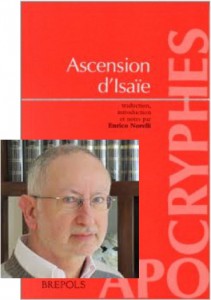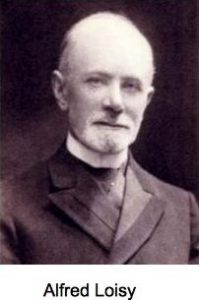Have recent posts here about two “son of man” sayings of Jesus missed their mark (claiming to be references to Daniel 7) if the term “son of man” was simply a common way for a speaker to refer to himself?
I have bolded key thought changes and background coloured examples to (hopefully) assist with easier reading. I have also kept the original page breaks with in-place footnotes.
A Read Herring: “The Son of Man” as Periphrasis for “I”
In order, however, to proceed into my own inquiry into the evidence of Mark for the “Son of Man” in early Judaism, I must first show why I do not accept the conclusion of Geza Vermes, who argued that it is just a circumlocution for “I.” In a series of articles, culminating in an important essay published as “Appendix E” to the third edition of Matthew Black’s Aramaic Approach,7 Vermes attempted to revive a theory that had been advanced and abandoned a century ago to the effect that “The Son of Man” is merely an ordinary Aramaic locution by which someone refers to themselves in the third person, hence “I.” I think it can be taken as granted that given Vermes’s exhaustive investigation, his study should be considered definitive,8 and if it fails, we can consider that suggestion as rejectable.9 Although an entire array of scholars have already disputed Vermes’s conclusion, none have, I think, shown that the interpretations of rabbinic literature adduced by him, do not stand, and that there is, therefore, no evidence whatsoever for the argument that in Aramaic, “son of man” can mean “I” (that it means a human being is, of course, not in doubt at all).10 I thus accordingly
———————
7 G. Vermes, “Appendix E: The Use of Bar Nash/Bar Nasha in Jewish Aramaic: An Aramaic Approach to the Gospels and Acts (ed. Μ. Black; 3rd ed.; Oxford: Oxford University Press, Clarendon, 1967), 310-28; P. Haupt, “The Son of Man = Hic Homo = Ego,” JBL 40 (1921).
8 P. Owen and D. Shepherd, “Speaking up for Qumran, Dalman and the Son ofMan: Was Bar Enasha a Common Term for ‘Man in the Time of Jesus?” JSNT 81 (2001): 84.
9 And it has been rejected by a host of scholars, from Fitzmyer through Jeremiah to Colpe, for all of which references see A. Yarbro Collins, “The Influence of Daniel on the New Testament in Daniel: A Commentary on the Book Daniel (ed. J.J. Collins; Hermeneia; Min-neapolis: Fortress Press, 1993), 94, n. 30.
10 It should be noted that Norman Perrin, A Modern Pilgrimage in New Testament Christology (Philadelphia: Fortress Press, 1974), 70, makes major use of this untenable argument to make his case that all Christological use of “The Son of Man” must be post-Easter, an argument that is, in this respect, repeated by Lindars, Jesus, Son Man.
essentially agree with Hans Lietzmann as cited by Vermes to the effect that “His main findings are that the term is a common one, and that it is used as a kind of indefinite pronoun (ברעש = jemand; לית בר נש- niemand; בני נש= Leute). It is, he writes, ‘die farbloseste und unbestimmteste Bezeichnung des menschlichen In-dividuums’ (p. 38). He then goes on to postulate what seems to him to be the only logical corollary: as a designation בר נש is by nature inapplicable to any particular man, let alone to Jesus, the greatest of all men (p. 40).”11 Lietzmann put the question brilliantly; his answer, on the other hand, that the Son of Man must be a Hellenistic terminus technicus is a non-sequitur, for even if semantically and syntactically “Son of Man” in Aramaic means indeed just a person and nothing else, pragmatically (by which I mean in the case of a particular set of syntagms), the “Son of Man” as a citation of Daniel could certainly have come to mean the Christ already in Hebrew/Aramaic. An example, just to make this clear, would be the following: “Rav” simply means “Rabbi,” but for the majority of Orthodox Jews in the U.S., “the Rav” means one and only one Rabbi, Rabbi Joseph Soloveitchik OBM. Let us, then, have a look at Vermes’s evidence.
In order to make his case, Vermes must demonstrate the alleged use of בר נש as a circumlocution meaning “I.” Although he gives several examples, in every one of these, rather than seeing a circumlocution for “I,” we can see quite a (different idiom. I shall first discuss an example that Vermes seems to consider particularly strong.12 In the first:
Jacob of Kefar Nibburayya gave a ruling in Tyre that fish should be ritually slaughtered. Hearing this, R. Haggai sent him this order: Come and be scourged! He replied, should בר נש be scourged who proclaims the word of Scripture? (Gen. Rabba vii 2)13
Vermes wishes to claim that, “theoretically, of course, bar nash may be rendered here as ‘one’, but the context hardly suggests that at this particular juncture Jacob intends to voice a general principle. Hurt by his opponent’s harsh words, he clearly seems to be referring to himself and the indirect idiom is no doubt due to the implied humiliation.”14 Vermes here simply confuses the semantics and the pragmatics of the sentence. Of course, pragmatically the speaker is referring to himself, but semantically he is using a general expression. An example from English will make this clear. In the famous and brilliant lyric from Guys and Dolls, Adelaide sings plaintively: “In other words, just by waiting around for that
———————
11 Vermes, “The Use,” 311.
12 Vermes, “The Use,” 321-2.
13 Genesis Rabbah (eds. J. Theodor and H. Albeck; Jerusalem: Wahrmann, 1965), 51. Ver-mes’s translation.
14 Vermes, “The Use.”
little band of gold […] a person could develop a cold!” Of course, pragmatically she is referring to herself; it is her own situation of which she complains, but semantically “a person” in English is an indefinite pronomial form and not a circumlocution for “I.”15 The same is true for this example and, mutatis mutandis, all the other ones that Vermes cites. But another should be cited, because, at least, of the mutatis mutandis:
When R. Hiyya bar Adda died, son of the sister of Bar Kappara, R. Levi received his valuables. This was because his teacher used to say, The disciple of בר נשא is as dear to him as his son. (Yer Ber. 5b)
There is not the slightest justification to see a circumlocution for “I” here either. Rabbi Hiyya has expressed a general principle that the disciple of a person is as dear to him as his son and the conclusion was drawn on the pragmatic level (in several senses) that he intended his disciple to be his heir.
Another example cited by Vermes turns out to be a counter-example:
Rabbi Shimon Bar Yoh said: “If I had been standing on Mt. Sinai at the hour that the Torah was given to Israel I would have demanded of the Merciful One that that human being would have been created with two mouths, one to be busy with Torah and one to do with it all of his daily needs.” Then he changed his mind and said: “If even with only one, the world cannot subsist because of all of the delations, if there were two all the more so!” [Palestinian Talmud Shabbat chapter 1, halakhah, page 3b]
Now it is obvious here, pace Vermes, that the Rabbi is not referring to himself as “that man” here, for then he would be, as well, accusing himself of being an informer, which he hardly was and hardly would do.16 There can be no doubt that here, as well, we must understand “הדין בר נש” here as “One,” German “Mann”, and nothing else. There remains not even one example in which the term Son of Man is a periphrastic usage for “I.”
In all of Vermes’s examples, then, “general principles are stated which are applied in the context of the narrative to an individual, usually the speaker.17 Vermes’s argument fails totally because he does not even once observe the
———————
15 Vermes’s citation of the answer “You […]” as confirmation of his thesis hardly needs refuting. Nathan Detroit, of course, would comfort Adelaide by saying: “Ah baby, you’ll be married soon.” That still doesn’t make “a person” = “I” semantically.
16 This consideration also thoroughly discredits Lindars’s reading according to which bar nesha here means “anyone (…) who was as deeply conscious of the divine generosity as Simeom himself,” Lindars, Jesus, Son of Man, 22. Even more sharply than with respect to the interpretation of Vermes, one would ask: Is this the class of people one would suspect of being informers to the Romans and even more so had they two mouths? I think the conclusion is inescapable that here (with or without haden=this), the meaning is the human being in general.
17 See examples cited Vermes, “The Use,” 323-7. For similar conclusions reached by slightly different methods, see Μ. Casey, “Method in Our Madness, and Madness in Their Methods: Some Approaches to the Son of Man Problem in Recent Scholarship,” JSNT 42 (1991): 18.
difference between semantic (lexical) meaning and pragmatic meaning or between sense and reference. There is, therefore, no evidence, whatsoever for “son of man” being used in Aramaic texts as a circumlocution for “I,” as Lietzmann realized.18
I conclude, therefore, that Vermes has adduced no convincing evidence that “Son of Man” was ever used as a circumlocution for “I” even in the Palestinian Aramaic of Late Antiquity; still less has he witnesses for the Aramaic of the first century. Vermes’s argument thus fails to convince on lexical philological grounds, in spite of its superficial attractiveness for the interpretation of some verses within the Gospels. Given that Vermes’s alleged idiomatic usage of “son of man” as periphrasis for “I” proves to be a ghost, another explanation of this genuinely weird usage must be sought. Lietzmann (and a host of others) have sought the explanation in the positing of a “Heavenly Man” or Anthropos myth underlying Christology. Rejecting (as have, I think, most interpreters by now) such far-fetched and far-flung explanations, to my mind, the only plausible one that remains is that of the great Jewish theologian and scholar of the last century, Leo Baeck, who wrote: “Whenever in later works ‘that Son Man,’ ‘this Son of Man’, or ‘the Son of Man’ is mentioned, it is the quotation from Daniel that is speaking.“19 In other words, I fully accept (as I think wë must) Vermes’s hypothesis of an Aramaic origin (in the oral traditions that lie behind the Gospels) for the phrase, “The Son of Man,” but deny his interpretation of that Aramaic
———————
18 For another review of Vermes’s evidence, arriving, however, at different conclusions, see Lindars, Jesus, Son of Man, 19-24. Lindars accepts only one example as fully relevant and builds his entire case on that, the example being y Shevi’it 38d: [Rabbi Shimon] sat at the mouth of the cave [where he was hiding from the Romans] and he saw a hunter catching birds. He spread his net. He heard a voice from heaven [ברה קול], say dimus [Dimissio], and it was freed. He said [to himself], “a bird does not perish without Heaven, so much more so a human being!” Lindars chooses to translate this as “How much less a man in my position,” without any warrant other than the alleged article on bar nesha. Given, however, the philological state of the Palestinian Talmud, as well as the centuries later date in any case, to build an entire interpretation of the Son of Man on this one highly doubtful example, seems almost to constitute scholarly legerdemain. There is no reason to imagine that Rabbi Shimon means a man in his position as opposed to any human whatsoever. Once again, a simple generic is being used and applied by the speaker pragmatically to himself. A bird doesn’t perish except by the will of Heaven, still less a human being, [so why am I hiding here]? What is most important to recognize is that if this idiom is operative, for instance, at Matthew 8:20: “Foxes have holes, and birds of the air have nests, but bar enasha has nowhere to lay his head,” it could only mean that foxes have holes and birds have nests but humans have nowhere to lay their heads, which is palpably false (Lindars, Jesus, Son of Man, 30), so despite the apparent similarity of this one single exemplum from late-ancient Palestinian Aramaic, we must resist the temptation to treat them as the same linguistic form, pace Lindars, Jesus, Son of Man, 29-31. Lindars’s own solution to this problem involves pure philological fantasy, nothing more or less. In another, longer version of this argument, I will provide further argument against Lindars’s position. Insofar as it depends on Vermes’s flawed conclusions, it is, in any case, untenable.
191 L. Baeck, Judaism and Christianity: Essays (Philadelphia: Jewish Publication Society of America, 1958), 28-9.
phrase. In what follows in this necessarily brief paper, I shall try to show how the hypothesis of literary allusion to Daniel in this phrase enables stronger readings of a pair of Markan loci.
Casey, Maurice. 1991. From Jewish Prophet to Gentile God: The Origins and Development of New Testament Christology. Cambridge, England: JClarke ; Louisville, Ky: Westminster/John Knox Press.
———. 2010. Jesus of Nazareth: An Independent Historian’s Account of His Life and Teaching. London ; New York: T&T Clark.






